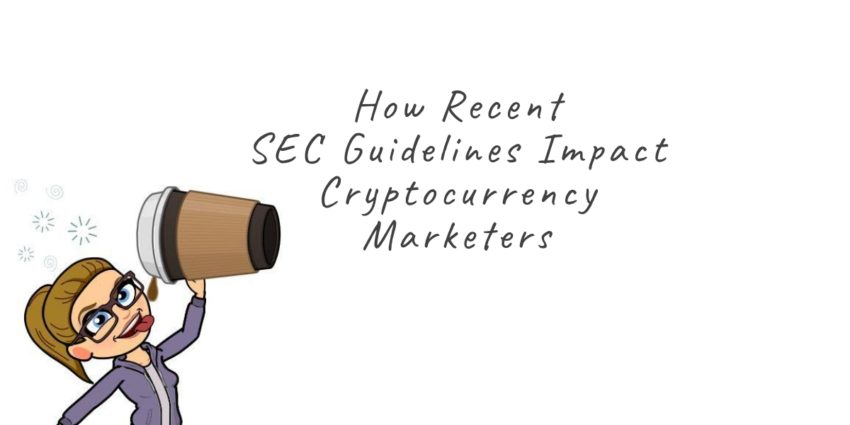The SEC recently released its official statement on the definition of ICOs, highlighting the fact that cryptocurrency tokens are likely securities, and pointing out ramifications for cryptocurrency industry professionals. This post views the SEC news from the cryptocurrency marketer’s perspective, answering three questions:
- What was said?
- Why does it matter to marketers?
- Where do we go from here?
What was said?
Our guide to initial coin offerings: https://t.co/N1cfvEjmM6
— SEC_News (@SEC_News) February 10, 2019
The SEC statement clarifies critical definitions surrounding ICOs, cryptocurrency, and requirements of professionals that serve the industry. This statement makes it clear that cryptocurrencies and the services associated with them are financial in nature.
“Companies and individuals are increasingly considering initial coin offerings (ICOs) as a way to raise capital or participate in investment opportunities. While these digital assets and the technology behind them may present a new and efficient means for carrying out financial transactions, they also bring increased risk of fraud and manipulation because the markets for these assets are less regulated than traditional capital markets.”
The SEC goes on to offer guidance to prospective cryptocurrency investors, including details on the nature of regulated exchange misrepresentation:
“Many platforms for trading digital assets refer to themselves as “exchanges,” which can give the misimpression to investors that they are regulated or meet the regulatory standards of a national securities exchange.”
And most importantly for marketers, The SEC provides a framework for cryptocurrency industry professionals:
? ATTN: Crypto Marketers ?
The regulation we’ve been tip-toeing around is coming. Act accordingly.https://t.co/bbpiScMjm7$crypto #marketing pic.twitter.com/0xtGwgVMSi
— Crypto Coffee
[Espresso Maximalist] (@Kristen_Colwell) February 10, 2019
Why does it matter to marketers?
Financial products and services already have well-defined constraints on advertising and marketing activities. The SEC’s descriptions of cryptocurrencies, ICOs, and the professionals serving the industry, are clearly aligned with current financial product and service regulation philosophy. Therefore, in the absence of advertising regulation specific to cryptocurrencies, it must be assumed by professionals that existing financial product and service compliance is expected.
This statement says it all:
“The SEC protects Investors, and expects you to.”
Where do we go from here?
Seasoned financial product and services marketers will be aware of the pitfalls already, and have likely avoided improper advertising and marketing tactics as a matter of habit. However, there is a new crop of marketers in cryptocurrency that are unfamiliar with the world of financial product and service marketing. The best way to approach this unknown is through education. Begin by reviewing the FTC Advertising and Marketing Guidelines for the Internet and Google Ads Financial Products and Services Guidelines to get a feel for the framework.
In the absence of specific regulation, always err on the side of caution in order to protect yourself, your business, and the brands you represent. And keep in mind this simple advice from The SEC:
